Current News
/ArcaMax

UK probes genetic link between obesity drugs and pancreas damage
The U.K. is asking patients whose pancreas became dangerously inflamed after taking obesity drugs like Wegovy and Zepbound to come in for tests to understand whether there’s a genetic risk for the condition.
The country’s drug regulator, alongside Genomics England, is investigating whether a person’s genetics might make them more ...Read more

Member of Wayne church security team who stopped gunman: 'God's hand of protection was over us'
Jay Trombley is certain God made sure every circumstance came together in the right way, and every person was in the right place, for churchgoers and safety team members at his Wayne church to prevent a mass shooting Sunday, starting with when the church first formed its security team about a decade ago.
Trombley, 57, and others who work as ...Read more

ICE arrests at L.A. courthouse met with alarm: 'Absolutely blindsided'
Immigration and Customs Enforcement agents arrested two women on Tuesday outside a West L.A. courthouse after a hearing in a local criminal case, marking the first instance in recent weeks of the Trump administration using a tactic that has drawn condemnation from the legal community.
Adriana Bernal, 37, was detained by ICE agents after ...Read more

Town tries to move on, heal after Karen Read acquitted of killing John O'Keefe
BOSTON — The town of Canton is trying to move forward after the jury acquitted Karen Read of killing John O’Keefe, but division remains high as some say a new police chief won’t solve everything, and others pray for healing.
After the jury in the retrial convicted Read of only the least serious charge of drunken driving, residents in the ...Read more

Harvard researcher who was taken into ICE custody at Boston Logan has been indicted
BOSTON — The Harvard researcher who was taken into ICE custody at Boston Logan airport for allegedly trying to smuggle in biological items has been indicted, according to the feds.
Russian national Kseniia Petrova, 31, was indicted on Wednesday by a federal grand jury in connection with attempting to smuggle clawed frog embryos and embryonic ...Read more

Last-minute budget change brings California housing policy fight to a head
Elements of California’s final budget deal are bringing to the forefront housing debates that have been simmering in the Legislature for years, forcing lawmakers to make big decisions before the new fiscal year begins July 1.
On Tuesday, Gov. Gavin Newsom, Assembly Speaker Robert Rivas and Senate pro tem Mike McGuire put out the main aspects ...Read more

Massachusetts education board bars locked, forced 'time-out rooms' in schools
BOSTON — The state Board of Elementary and Secondary Education voted unanimously Tuesday to narrow the use of “time-out” rooms in schools, taking steps to ensure the spaces are safe and unlocked and seclusion is only used in emergency situations.
“Inclusive, accessible, safe and welcoming school environments are critical for students to...Read more
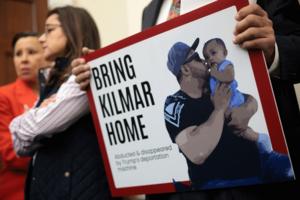
Abrego Garcia ordered freed, but faces re-arrest by ICE
Kilmar Abrego Garcia, the Maryland man who the Trump administration mistakenly deported to a prison in El Salvador, remains in legal limbo after defeating a bid by the government to keep him locked up on criminal charges.
While both a U.S. magistrate and a district judge have said Abrego Garcia should be released, lawyers for the government and...Read more
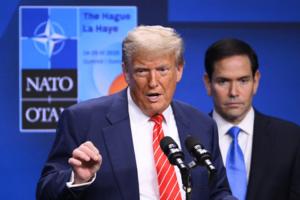
Trump says US and Iran will talk next week, Mideast war over for now
WASHINGTON — President Donald Trump said the U.S. would hold a meeting with Iran next week but cast doubt on the need for a diplomatic agreement on the country’s nuclear program, citing the damage that American bombing had done to key sites.
“We’re going to talk to them next week,” Trump said Wednesday at a press conference during the...Read more
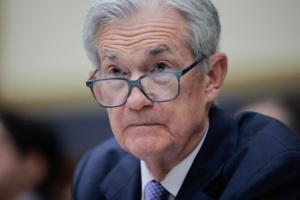
Trump says three or four people on list to replace Fed's Powell
WASHINGTON — President Donald Trump said he has three or four people in mind to succeed Federal Reserve Chair Jerome Powell when his term expires next year.
“I know within three or four people,” Trump said Wednesday during a press conference at The Hague, where he is attending the NATO summit. “I mean he goes out pretty soon, ...Read more
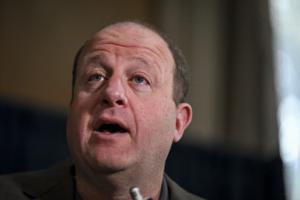
Denver judge says ICE subpoena doesn't comply with state law, but doesn't prohibit Gov. Polis from responding
DENVER — A Denver judge said Wednesday that state law doesn’t allow officials to comply with a federal immigration subpoena that Gov. Jared Polis had decided to fulfill, and he prohibited the governor from directing a senior state employee and his staff from turning over personal information to authorities.
But District Judge A. Bruce Jones...Read more

Yosemite worker dies in fall while rock climbing in park, officials say
A hospitality worker in Yosemite National Park suffered a fatal fall while rock climbing in the park, officials said.
The employee was “off the clock and engaging in recreational activities during their free time,” an Aramark Corp. spokesperson told McClatchy News in an email on Wednesday. Aramark is the parent company of Yosemite ...Read more
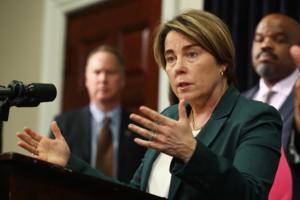
Critics of Maura Healey's energy bill line up, as governor sells $10 billion savings
A plan by the governor which she says will save Bay State ratepayers $10 billion over the next ten years was the subject of an almost six hour hearing on Beacon Hill — with opponents questioning whether lawmakers were just going through purely theatrical motions, and supporters calling the proposal a step toward lowered costs.
Healey’s plan...Read more

Disgraced Boston City Councilor Tania Fernandes Anderson takes victory lap in final meeting
BOSTON — Disgraced Boston City Councilor Tania Fernandes Anderson took a victory lap in her last meeting after resigning from the Council and painted herself as a victim of a broken system ahead of her sentencing next month on federal corruption charges.
Despite the circumstances of her departure, Fernandes Anderson was showered with praise ...Read more

Lawsuit alleges Nevada inmate was held down, killed by corrections officers
Two weeks before he was to be released from prison, Patrick Odale was pepper-sprayed, held down, and killed by corrections officers, according to a lawsuit filed this week.
The mother of his children is suing multiple government agencies and officials over his death.
Odale, 39, was pronounced dead at Southern Desert Correctional Center on Dec....Read more

HUD plans to move operations from Washington to Virginia
WASHINGTON — The U.S. Department of Housing and Urban Development is relocating its headquarters to a federal building in Virginia, months after the agency’s existing space downtown in Washington was put up for sale as part of a broader effort by President Donald Trump’s administration to consolidate its real estate.
The move, announced ...Read more

Abrego Garcia ordered freed, but faces re-arrest by ICE
Kilmar Abrego Garcia, the Maryland man who the Trump administration mistakenly deported to a prison in El Salvador, remains in legal limbo after defeating a bid by the government to keep him locked up on criminal charges.
While both a U.S. magistrate and a district judge have said Abrego Garcia should be released, lawyers for the government and...Read more

Pakistan says it's nominating Trump for a Nobel Peace Prize -- does he deserve it? What a poll found
President Donald Trump has been nominated for one of the most prestigious and sought-after awards in the world: the Nobel Peace Prize. But, few Americans think he is deserving of the high honor, according to new polling.
The government of Pakistan, on June 20, announced it was recommending Trump for the 2026 peace prize for his role in securing...Read more

5th grade girls accused of plotting to kill boy, make it look like suicide
A quartet of fifth grade girls in Arizona is accused of plotting to kill a boy in their class and make his death look like a suicide.
Law enforcement in the Phoenix suburb of Surprise said each girl had a role in the plot to lure their schoolmate into a bathroom and stab him in the stomach, reported Arizona Family, citing a newly released ...Read more

LAPD says it didn't help ICE during downtown LA raid; immigration rights groups disagree
LOS ANGELES — Immigrant rights activists are denouncing the Los Angeles Police Department after officers were videotaped separating an angry crowd from a group of masked federal agents as they loaded a woman into the back of an SUV.
"The people were coming out to defend them and guess who protected the kidnappers who are kidnapping our people...Read more
Popular Stories
- Former University of Kentucky student charged in racist attack released early from jail
- US strikes crippled Iran's nuclear program, Israeli analysis finds
- LAPD says it didn't help ICE during downtown LA raid; immigration rights groups disagree
- Connecticut man accused of threatening Bristol Health CEO
- Lawsuit alleges Nevada inmate was held down, killed by corrections officers





